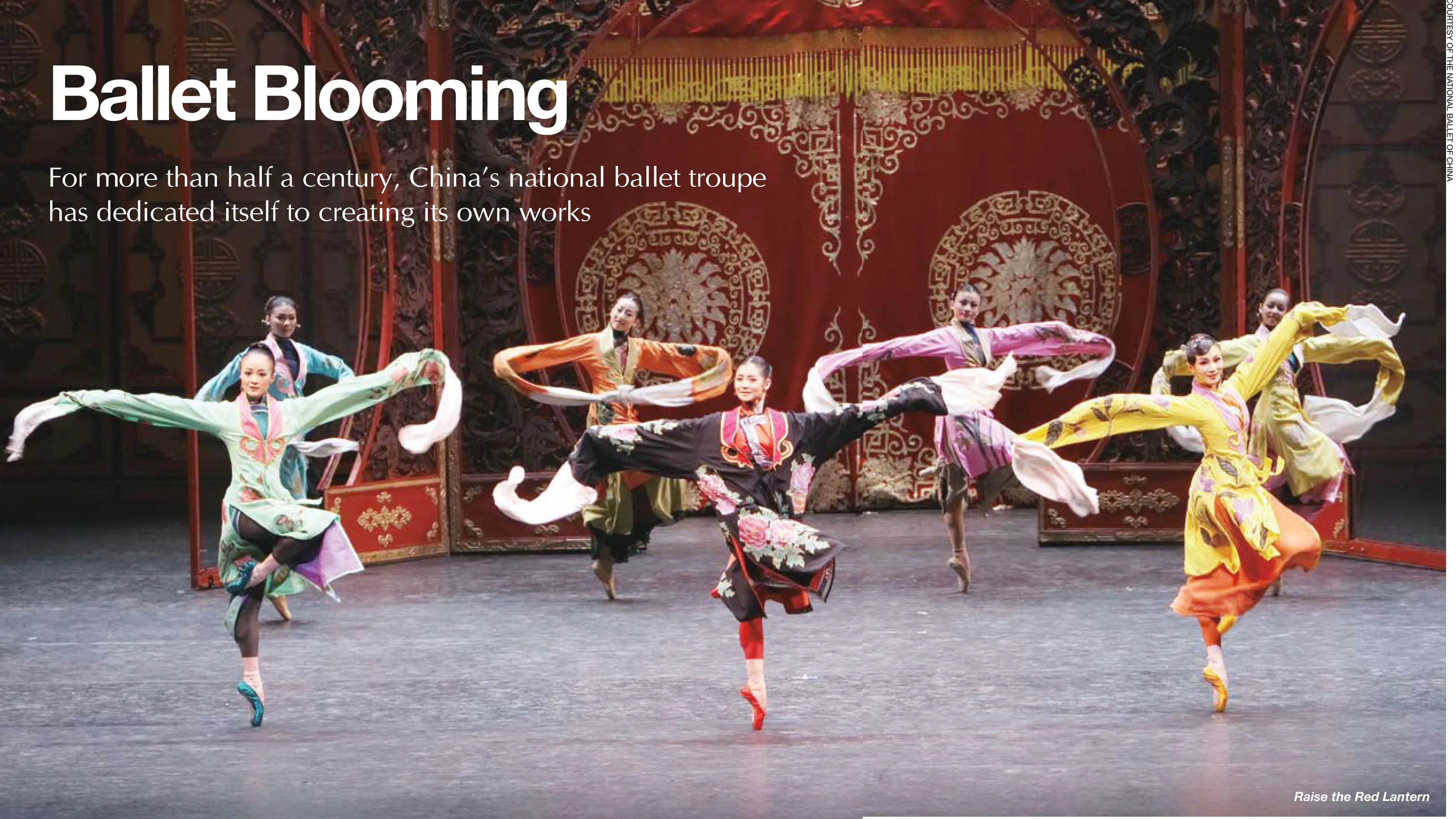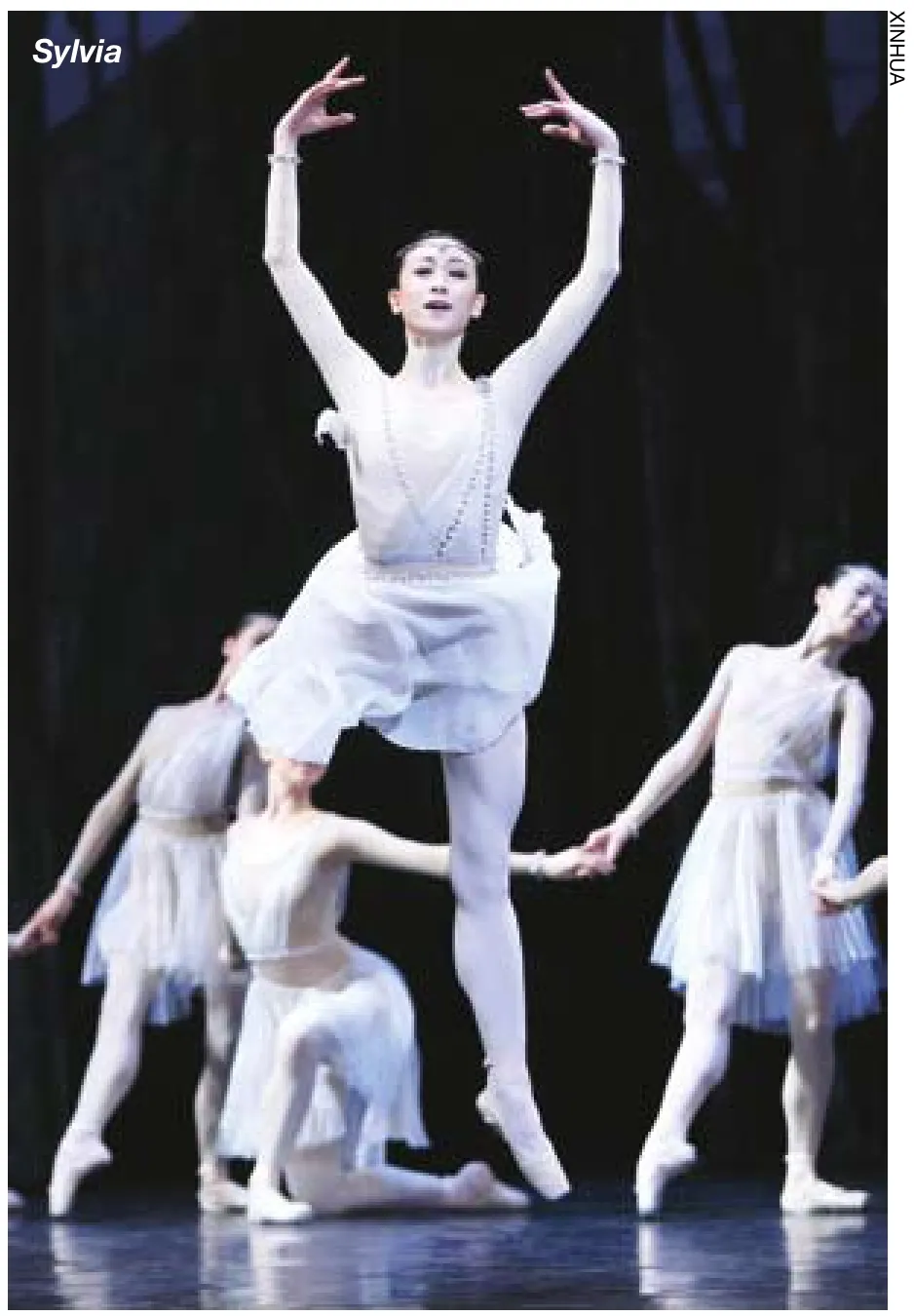Ballet Blooming
For more than half a century, China’s national ballet troupe has dedicated itself to creating its own works

By ZAN JIFANG
With The Red Detachment of
Women, Swan Lake and four more representative works,the National Ballet of China(NBC) kicked off its 2009 performance season last December, a grand ballet feast celebrating the company’s 50th anniversary.
As China’s first ballet company, NBC is seen as a pioneer of the country’s ballet art,and its growth as epitomizing the art form’s development. In 50 years, it has realized a tremendous transition from being an experimental troupe at the Beijing Dance School(today’s Beijing Dance Academy) to one of the most important companies on the world ballet stage.
Tough start
On December 31, 1959, the Experimental Ballet of the Beijing Dance School was founded. In 1963, it was renamed the National Ballet of China.
The birth of the company directly relates to the founding of the Beijing Dance School in 1954, when ballet became one of the subjects. The school, which had been built with the help of Russian experts, became known as “the cradle of Chinese ballet.” The first group of graduates from its ballet major became the earliest dancers of NBC. Among them was Zhao Ruheng, who later became president of NBC.
“We have beautiful memories about those years. The Central Government greatly supported us. We did not need to pay for study at the school and we had a nutritious diet including eggs, bread and butter, which was much better than in other schools at that time, when the country was very poor,” Zhao said.
Teaching at the school was very strong,Zhao said. Most of the teachers, such as ballet master Pyotr Gusev, came from Russia.Other teachers were Chinese who had been strictly trained by Russian tutors such as O.A.Yealina, the first Russian expert in China at that time, who had arrived before the opening of the school.
“If you had been to Russia to learn ballet, you might not have been lucky enough to be taught by so many excellent masters.In this sense, Russian experts were undoubtedly the founders of Chinese ballet,”said Zhao.
Swan Lake was the first work the school’s students learned and performed. In 1958, the school presented it to a Chinese audience with Zhao as a swan.
Recalling those years, Zhao said the school’s rapid development in its early stages was attributable to the direct guidance of state leaders, especially Premier Zhou Enlai.
“Most of our state leaders had studied abroad and had their own appreciation of art, so they greatly supported introducing all sorts of the world’s excellent art forms to China,” Zhao said. She considers it is a farsighted decision to set up a ballet school and then a national ballet company when the country’s economy was still in recovery.
Dif fi culties soon arrived. In 1961, Russian experts left China because of the breakup of two countries’ relations, a blow to the young company. But the teaching at the dance school and the development of the company did not stop. Many students who had majored in ballet overseas returned and successfully took up the tasks of teaching and training.
“No matter what dif fi culties we encountered, we never stopped dancing,” Zhao said.“All the dif fi culties taught us how to survive in adversity and about the true meaning of art.”
Because they persisted, within the following 10 years, Chinese choreographers and dancers were able to create, rehearse and perform ballet dramas without the help of foreign experts. Since 1964, NBC has been creating its own works based on Chinese cultural elements. Most of the nation’s first generation of choreographers had backgrounds in traditional Chinese dance, and that directly helped their explorations.
In that year, Li Chengxiang, Wang Xixian and Jiang Zuhui choreographed The Red Detachment of Women with the theme of Chinese Communist revolution, marking the birth of ballet with Chinese cultural characteristics. For the first time on the world ballet stage appeared a group of ballet dancers in army uniform and holding guns.Audiences were deeply impressed, as they had never imagined elegant ballerinas could perform tough characters. This work also won world acclaim when it was performed on foreign stages.
Growing in stature
The success of The Red Detachment of Women not only meant the birth of a masterpiece, it also showed the direction of development for China’s ballet, which was more important to the country’s ballet circles,Zhao said. After its staging, Chinese ballet artists became more and more clear that, while continuing to interpret world tradition, creating new works inculcating Chinese cultural ele-ments would be the principle animating their development.“Since then, creating Chinese own ballets has always been the mission of NBC,” Zhao said.
Based on the experience of The Red Detachment of Women, NBC continued and are continuing to create excellent dance pieces marked by a strong Chinese style, such as Raise the Red Lantern (2001) and The Peony Pavilion (2008),another two classics, that helped the company and Chinese ballet win worldwide respect.
At the same time, the company has constantly expanded exchanges with the rest of the world. The earliest foreign trip of the company was in 1961, when Chinese dancers performed Swan Lake in Myanmar as cultural ambassadors. Since the 1980s,the company has started commercial performances in other countries, including the United States and Britain, where China’s ballet has been warmly welcomed. In 2008 and 2009, the company was invited to perform at the Royal Ballet of Britain and the Paris Opera Ballet respectively, dream platforms for Chinese ballet dancers and proof that NBC has grown to be one of the world’s most important companies.
These amazing achievements came about through strict training and the open management ideas of the company’s leadership. In 1972, Zhao was forced to leave the stage because of a severe foot injury. But she never gave up her beloved dance career. In 1993, she was appointed president of NBC, which ushered in another stage in her life, as well as that of her company. “I could not dance, but I hoped I could help others to dance better,”Zhao said.
To improve its performance level,the company carried out many reforms.Some of them were painful, Zhao said.Her first reform move was to try to maintain a young performing group.In the early 1990s, the average age of NBC dancers was 39, and the company had even been called “the oldest ballet company in the world.” This greatly limited further development.
After the reform, the average age of the company’s dancers is now held at around 20. But, at the same time,the company has helped dancers older than 35 find other career avenues. It has also employed a new payment system that follows market economy rules.

Zhao Ruheng, ballet dancer and President of NBC from 1993-2008
Strict, professional training has also helped to cultivate first-class dancers. Young dancers make rapid progress within two or three years after joining the company,and many of them have won gold, silver and bronze medals at major international competitions. The company is therefore seen as a base for rising stars.
The company has also continued introducing highclass and fresh foreign ballets of different genres to make the best use of its dancers. “We want to explore the potential of our dancers to see how far they can go,”Zhao said. “In this way, we have found Chinese dancers can do whatever foreign dancers can.”
“Sometimes, when we contacted foreign ballets or choreographers to introduce their works, they would often express doubts about our strength, saying ‘it’s impossible for Chinese dancers.’ But when we invited them to visit China and view our performances, they were always deeply impressed,” said Zhao.

John Neumeier, Art Director of the Hamburg Ballet of Germany, who recently brought his classic work The Lady of the Camellias to Beijing, was one of the witnesses of ballet’s rapid development in China.
Zhao said that, in 1999, Neumeier and the German ballet performed in Beijing,but it had not been a very pleasant trip for Neumeier. Acoustics were not satisfying and Chinese audiences were not overly attentive.
“But this time, he was greatly impressed by the change in the audiences,” Zhao said.Neumeier told her that he could feel the audiences were feeling the dance “in their hearts,” which moved him greatly.
In similar communication with foreign artists and troupes, the overall performing strength of NBC improved rapidly and at the same time brought Chinese ballet to the world, Zhao said.
Cultural messenger
Cultivating its own audience is another task NBC has faced squarely. “We have always thought about how ordinary Chinese can be able to watch and love ballet. It should not be something distant from the public,” Zhao said.
For years, NBC has dedicated itself to popularizing ballet to ordinary people. It often invites ballet lovers to visit the company to see how the dancers are trained, how they rehearse, and welcome them to talk to the stars they admire. It has also been a tradition of the company to invite local residents to the company and perform for them, giving lectures and answering questions. “The effect is very good,and our audiences are very active and enthusiastic,” said Zhao.
The company also visits colleges and universities to popularize ballet among students. Peking University has been a long-term cooperative partner.“Even before interior decoration of the university’s theater was completed, we started to perform there,” Zhao said.Combining high-quality dance and low ticket prices, the performances attracted a great number of young onlookers.
Besides performance, the company has also paid great attention to talking about the art form in schools, on TV and radio, and by way of other media.
The company maintains ties with the two-year-old China National Center for Performing Arts (NCFPA),where Zhao now works as dance director after her retirement from NBC in 2008.
“The NCFPA provides a good platform to present stage art to Chinese audiences. Since the opening of the theater, NBC has performed there nearly 50 times, presenting 11 different works and producing more than 10 million yuan ($1.5 million) in box of fi ce takings,” Zhao said.

FOREIGN CONDUCTOR: English choreographer Sir Anton Dolin directs dancers at the National Ballet of China in the early 1980s
Besides NCFPA, the company also has its own theater, Tianqiao Theater, in Beijing,a first-class professional theater for the art of dance. It performs there as often as it can every year, and always aims to keep ticket prices affordable.
In recent years, the company has placed growing importance on ballet popularization and promotion. “This is what we have learned from foreign counterparts. When we performed in foreign theaters, the organizers would often introduce our troupe and give the cultural background of the work to be presented to audiences, and that inspired us greatly,” Zhao said.
Now, Zhao often gives a short lecture before every NCFPA ballet performance and puts across basic ballet knowledge. She is presently considering ways of creating chances to give lectures to enable audiences to have the best possible experience and to enable them to better interact with dancers.
Although having left NBC, Zhao is still concerned about the future of the company and the art form itself in China. She said she was not particularly upset when she retired two years ago, as she knew the company would move to a younger leadership team that would take it to a higher level. But when she watched the last performance of the company for the 50th anniversary celebration on December 31, 2009, her eyes were full of tears.
“I feel very proud to be one of those who have experienced the magic growth of ballet in China from point zero to glory, and I suddenly realized at that moment that I could not leave ballet, leave those wonderful dancers,” she said.
As a participant in and witness of the development of Chinese ballet during the past 50 years, Zhao stressed that it was through NBC that ballet began to be known to ordinary Chinese, and it was also through the company that foreigners know how the originally Western art form is loved and enjoyed by Chinese.
“Ballet is like belief to dancers. Every success has been achieved by times of tears and sweat. Since we have started, we will not stop,” she said. ■

